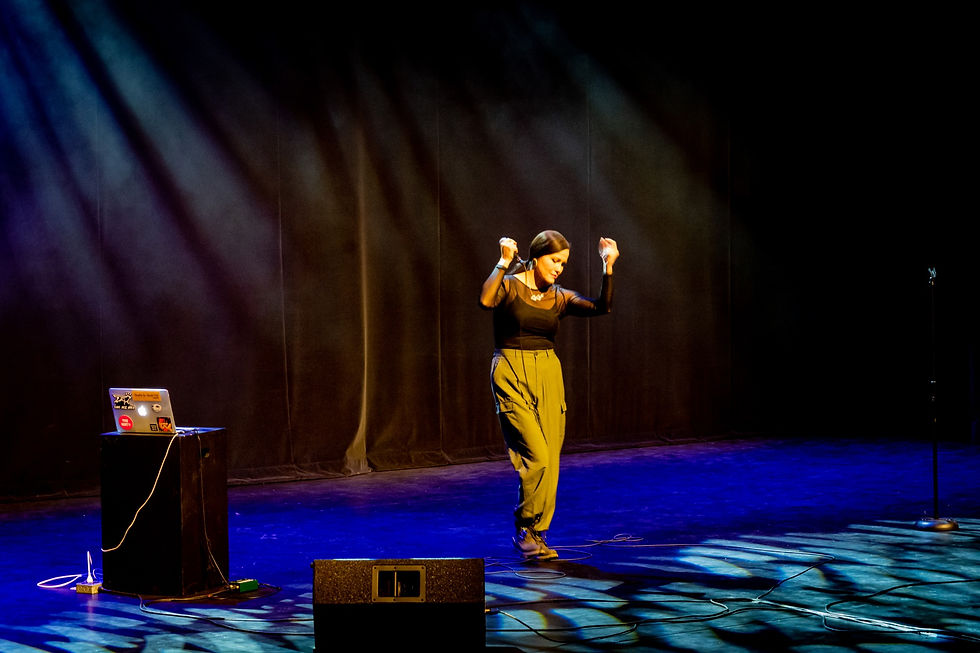By Scott Roos

For Saskatoon-based wordsmith Lindsay Knight (aka Eekwol), the idea of hip hop is seen as a tool to educate and inspire her listeners to seek systemic change. Born in Winnipeg but raised in Saskatoon, Knight is also a member of the Muskoday First Nation via her father. As a result, her varied upbringing has served to give her a heart and voice for indigenous issues.
“We’re in Saskatchewan. It’s conservative as heck. There’s so much work to be done and I don’t even know if political parties are the ones that will be able to make those systemic changes," explains Eekwol.
Hip hop, then, with it's leaning towards themes of standing up for those who are oppressed and speaking truths when needed are what a young Eekwol turned to early on. It was in eleventh grade, in the late 90's, that she first learned of the Residential School System. It altered her mindset and she had not looked back since.
"There was one teacher. We had a Social Studies class and he said ‘y’know what just put the book down we’re not going to talk about this’ and he’s like ‘we’re going to talk about something called colonization’, " says Eekwol, "And I was like ‘I have no idea what that is’ and he kept going and said ‘there’s this thing that happened here. it’s called Residential School System’ and I think I was in about grade eleven and I was like ‘Woah! Mind blown’"

It's amazing what one lesson can do to literally change or alter the future. Education, and teaching in general, is a noble profession. There's a lot of power in a teacher's words and it's amazing sometimes to trace things back to their source and discover that it comes from one educator that had the presence of mind to speak up on an issue and teach the truth, even if it's unpopular or not spoken of. In the case of Eekwol, that day and that exact lesson was pivotal in shaping a long and award winning career in hip hop.
"I had grown up in those intergenerational effects. I didn’t know that my dad went to Day School. I didn’t know that my grandparents went to Residential School. Nobody talked about it in our family. It was just one of those things. (The Mindset was) Nope just don’t talk about it. It’s too hard. Don’t teach the kids about it. So when I learned about it it’s like all the pieces started to fall into place. I understood now," related Eekwol.
Now the atrocities brought about by the Residential School System are taught as part of the process of reconciliation and different schools and educational institutions are participating in the process in varied ways but hopefully collectively working together to bring about that elusive systemic change.
"To be in such a traumatic experience for years on end there’s no question that there’s going to be a lot of addictions, a lot of violence, a lot of crime. Everything. So the fact that (Residential Schools are) being taught (about) now and if I were to ask my kids I think right from grade one they start talking about it so we’ll see what that does. (We'll see) if that creates a bigger shift in the societal fabric. I think it will," says Eekwol.
It's an educated, informed, and hard biting truth, then, that permeates through Eewkol's music whether she is rapping about indigenous issues or women's issues. It's an approach that taken her far and captured her a fair amount of critical acclaim. But it's also padded with an overall optimistic sense that the future is brighter than many would have you believe.
“I’m very vocal about issues but also (vocal) about a hopeful future,” explains Eekwol, “So I try not to keep it (all) on the negative ‘hard reality’ stuff. There’s also a lot of hopefulness and that comes with being a mother and seeing a lot of good things in young people of all backgrounds and all nations. (The younger generation) are so much more woke than I was in the 90’s and 2000’s when I was young person. So there’s a lot of hopefulness that I try and bring to the stage too.”
Moving forward, during the quarantine, Eewkol has been working slowly and steadily on new material having had the time to even perfect her guitar playing. She's the niece of Juno Award winning folk singer Chester Knight so the culture of guitars and music is embedded deeply within her. She grew up with her cousin and Chester travelling around to various festivals and venues, meeting musicians and in general just getting exposed to the circus that is the music industry. It's part of who she is and it makes her a natural performer. Even though COVID has been seen as a virus that's been keeping may artists down, it's not going to stop Eekwol from continuing to do what she loves.

*pics By Deanna Roos of Contingent Colours Photography
留言